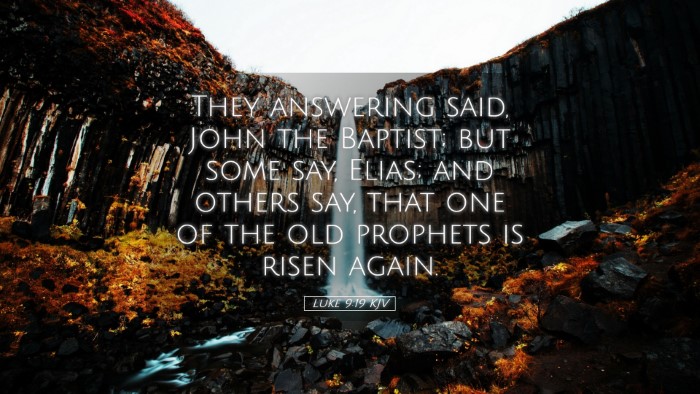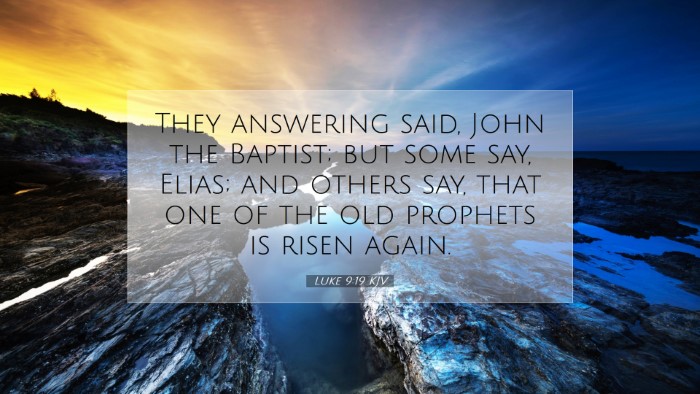Bible Commentary on Luke 9:19
Verse: "They answered, 'John the Baptist; but some say, Elijah; and others say that one of the old prophets has risen again.'" (Luke 9:19)
Introduction
The context of Luke 9:19 is significant as it follows the miraculous works of Jesus, leading to a critical moment of revelation concerning His identity. This verse is part of a larger narrative where Jesus, having performed miracles and taught the multitudes, questions His disciples about public perception of Him. The responses reveal a pivotal understanding regarding the prophetic tradition in Israel and the people's expectations of the Messiah.
Commentary Insights
Historical Context
Understanding the historical backdrop of Luke's Gospel is essential. During the time of Jesus, many were anticipating a prophetic figure like John the Baptist or a new Elijah to come. The Jewish tradition held a firm belief in the return of these prophets, and the people were eager for a messianic deliverance. This context helps clarify why the disciples would respond with these prominent figures.
Matthew Henry's Perspective
Matthew Henry emphasizes the questioning nature of Jesus as a means to elicit the faith of His disciples. He notes that their responses reflect both the confusion of the masses and the deep reverence with which they considered Jesus. Henry suggests that various opinions about Jesus’ identity point to the spiritual hunger of the people and their desire for restoration through familiar prophetic figures. Henry concludes that acknowledging Jesus as merely a prophet undermines His true identity as the Messiah.
Albert Barnes' Commentary
Albert Barnes elaborates on the responses given by the disciples. He highlights the significance of the people's view of Jesus as akin to figures like John the Baptist or Elijah, both of whom were considered powerful prophets. Barnes points out that by associating Jesus with these prophets, the people inadvertently diminish His role as the Savior. He argues that while respect for the prophet figures is warranted, it is equally essential to recognize Jesus’ unique position as the Son of God and the fulfillment of all prophecy.
Adam Clarke's Analysis
Adam Clarke provides a grammatical and cultural exposition of the text. He examines the implications of the titles assigned to Jesus and their biblical measurements. Clarke notes that the belief in resurrection was strong among the Jews, and thus attributing Jesus' works to a risen prophet was not uncommon. He articulates that while the peoples' responses signify various misunderstandings, they simultaneously affirm the notion that Jesus was operating in the power of God, as seen through extraordinary deeds performed among them.
Theological Implications
This passage highlights several theological themes that are critical for pastors, students, and scholars alike:
- Identity of Christ: The varying perceptions of Jesus challenge believers to consider who Jesus truly is beyond cultural misconceptions.
- Expectations of Messiah: The misunderstanding of Jesus' role reflects the broader tension between divine intention and human expectation.
- Prophetic Tradition: The association with prophets illustrates the continuity of God's work through history, culminating in Christ.
Practical Application
In light of Luke 9:19, it is pivotal to encourage congregants and students of the Word to engage with the identity of Christ. Key questions can guide this exploration:
- How do we view Jesus within the context of our lives? Are we limiting His authority by confining Him to past narratives?
- What misconceptions about Christ do we need to address in our theological teachings?
- How can understanding the prophetic lineage enhance our appreciation for Jesus' mission on earth?
Conclusion
Luke 9:19 serves as a critical juncture in the Gospel, prompting both introspection and revelation. Through insights gained from various commentaries, we see that the apprehension of Jesus' identity is foundational to discipleship. For contemporary readers and scholars, it poses a call to deeper faith, challenging all to acknowledge Jesus as the Messiah who fulfills the law and the prophets, transcending historical expectations.


